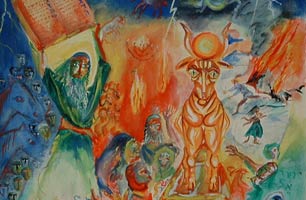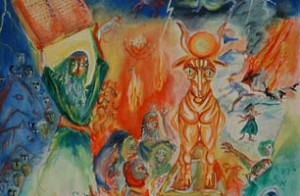There is an old joke that goes something like this:
The rabbi sees Mrs. Schwartz in the grocery store just before the High Holidays. He greets her as most rabbis would, “Mrs. Schwartz, it’s so good to see you. I look forward to seeing you in the synagogue for the High Holidays.”
She replies, “It’s good to see you, too, rabbi. But I don’t think I’ll be coming.”
“Oh,” said the rabbi, “I hope everything is alright. Why won’t you be there?”
“Well, rabbi,” she responds, “Every year, it’s the same old thing. We even read the same Torah portion.”
Although the joke isn’t particularly funny, it notes an essential part of our wisdom tradition; every time we read “Bereishit Bara Elohim” or any part of the Torah, it is different because we are different. Every time we engage in a text, our understanding differs from the last time. Our experiences shape and influence us and, therefore, also affect how we grasp the text. Our lives have evolved, and likely, the questions on our minds do, too. All of us have experienced the same thing differently. Let me explain.
Think about returning to a place you’d been before. Despite our expectations, we experience it differently this time around. The river is not the same water; our favorite book or movie reveals different secrets. Even my beloved childhood Twinkies do not taste the same.
A teacher of mine shared that the answers you get depend on the questions you ask. Our texts are treasure troves, just waiting for us to uncover the precious jewels they contain. The questions I ask in middle age are very different from the ones I asked as a young person. The issues I confront today in our current climate have me seeking answers to deeply troubling questions about meaning, seeking wisdom from this insightful tradition.
We begin again with the first words of the Torah. But what does it mean? How does the message resonate with you now?
This has been a challenging year for Jews. The Oct. 7 invasion of Israel, the war starting in Gaza and expanding into Lebanon, threats from Iran, deep political unrest, antisemitism cloaked as anti-Zionism/anti-Israel and unvarnished Jew-hatred appearing across this country and the world have most of us reeling. We are shaken to our core and struggling to figure out how we move forward. Our texts are compelling and filled with timeless wisdom, and we grapple with them this year in ways that we didn’t expect.
During the High Holidays, we are reminded that God understood the need to create a world that balanced Din and Rachamim, law and compassion. Midrashim share stories that this world was not God’s first attempt. Previous creations failed due to the heavy reliance on one or the other trait. Our stories also tell us that the Torah existed even before creation.
This leads me to an interesting thought. Perhaps even the divine approaches the Torah differently, learning from each encounter. Even the almighty learns from the Torah.
Moses once asked the eternal one what would happen to the wisdom once Moses was gone. God sweeps him into a class taught by the sage Rabbi Akiva. Moses is perplexed as nothing Akiva says seems familiar to him as he listens. And then, as if on cue, Akiva closes with, “And all of this comes from the Torah of Moses, our teacher. One of the fantastic parts of our tradition is the messages of core values that remain timeless even if the way they are practiced or understood evolves with the generations.
Our mystical stories talk of black fire and white fire, describing our sacred scrolls.
The words, the letters of the words and even the white spaces on the sacred text are opportunities for us to learn, using the holy text as a timeless source of knowledge, bounded only by our ability to comprehend it.
So, Mrs. Schwartz didn’t get it quite right. As we read the story of God’s creating, let us use this as a chance to see not an old story but as one of a new beginning, reading with fresh eyes, engaging it and asking the essential personal questions as the story of the world and the Jewish people continues to unfold.
Rabbi David Levin is the founder of the Jewish Relationships Initiative, which aims to help seekers of meaning through Jewish Wisdom in human relationships and end-of-life challenges. He is also vice president of the Board of Rabbis of Greater Philadelphia. The Board of Rabbis of Greater Philadelphia is proud to provide diverse perspectives on Torah commentary for the Jewish Exponent. The opinions expressed in this column are the author’s own and do not necessarily reflect the view of the Board of Rabbis.


